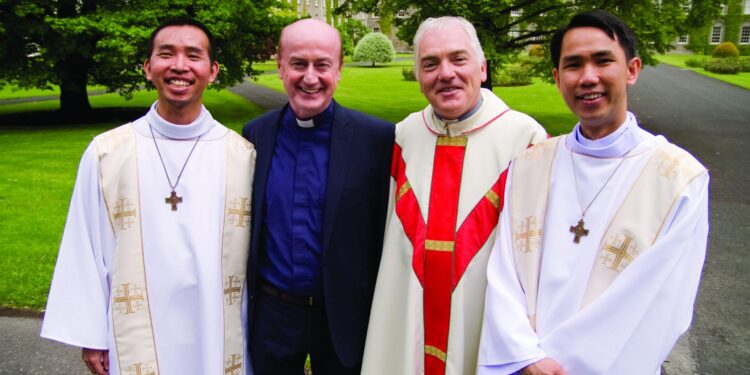Nairobi, Kenya – The Salesians of Don Bosco in Kenya are poised to launch a sweeping Integral Ecology Plan aimed at transforming their current fragmented environmental initiatives into a unified, comprehensive strategy. This bold move seeks to address the ongoing challenges posed by climate change, environmental degradation, and social inequities through an integrated approach that combines ecological justice with community development. By moving beyond the traditional “piecemeal” efforts, the Salesians hope to set a new benchmark for holistic sustainability within Kenya and the wider African region. The rollout of this plan signals a significant step forward in the Church’s commitment to stewardship of creation and social responsibility, aligning closely with Pope Francis’ Laudato Si’ encyclical.
Salesians Advocate Holistic Environmental Strategy to Address Fragmented Conservation Efforts in Kenya
In response to the growing concerns over fragmented conservation efforts across Kenya, the Salesians have unveiled a pioneering integral ecology plan. This strategy aims to weave together environmental protection, social justice, and sustainable development into a unified framework. By emphasizing interconnectedness between communities and their ecosystems, the initiative targets not only conservation but also the enhancement of local livelihoods. The Salesians stress that piecemeal projects have often led to duplication and inefficient resource use, undermining long-term sustainability.
Key pillars of this holistic approach include:
- Community Empowerment: Engaging local populations as active stewards of their environment.
- Education & Awareness: Implementing environmental education programs in schools and community centers.
- Collaborative Partnerships: Strengthening ties between government agencies, NGOs, and faith-based organizations.
- Resource Management: Promoting sustainable agricultural practices and water conservation techniques.
| Focus Area | Expected Outcome | Timeline |
|---|---|---|
| Community Workshops | Increased local participation | 6 months |
| Tree Planting Drives | Restoration of degraded land | 12 months |
| School Eco Clubs | Youth environmental leadership | Ongoing |
Community-Centered Initiatives Form Core of New Integral Ecology Plan for Sustainable Development
Grounded in the voices and needs of local communities, the new integral ecology plan launched by the Salesians in Kenya marks a significant shift from fragmented efforts to a unified and strategic approach. By prioritizing community participation, the plan ensures that environmental, social, and economic development goals are addressed side by side, creating sustainable solutions tailored to each locality. Collaborative forums and workshops have already begun to empower youth, women, and elders to take active roles in co-designing projects that enhance natural resource management, promote clean energy, and restore degraded ecosystems.
Key elements of this community-driven model include:
- Participatory Decision-Making: Local stakeholders influence project priorities and implementation strategies.
- Capacity Building: Training sessions focus on environmental stewardship and sustainable livelihoods.
- Resource Sharing Networks: Communities pool knowledge and tools to maximize impact and reduce duplication.
- Monitoring & Reporting: Transparent mechanisms ensure accountability and continuous improvement.
These integrated practices underpin the plan’s ambitious target: achieving measurable improvements across social welfare, ecological health, and economic opportunity-all without sacrificing one for the other.
Experts Recommend Strengthening Local Partnerships to Enhance Impact of Salesians’ Environmental Programs
In a recent forum held in Nairobi, environmental specialists and community leaders emphasized the critical need for robust local collaborations to significantly amplify the effect of Salesians’ environmental initiatives. They highlighted that integrating efforts with grassroots organizations, local government units, and educational institutions is essential to move beyond isolated actions and foster sustainable, community-driven ecological development. Key recommendations included:
- Establishing formal partnerships with local NGOs for resource sharing and co-implementation.
- Engaging youth and community groups through participatory environmental education programs.
- Leveraging indigenous knowledge to tailor solutions that align with local ecosystems.
Experts pointed out that such alliances not only enhance the reach and efficiency of programs but also ensure cultural relevance and long-term commitment from beneficiaries. They stressed that without these local partnerships, efforts risk remaining fragmented and short-lived. To demonstrate this, the panel presented a comparative overview of partnership impacts observed in pilot projects across several Kenyan counties, underscoring measurable improvements in community engagement and ecological restoration.
| County | Partnership Status | Community Participation | Ecological Outcome |
|---|---|---|---|
| Nakuru | Strong local alliances | High (75% youth involved) | Reforestation increased by 40% |
| Kisumu | Limited collaboration | Moderate (50% adults engaged) | Water quality improved slightly |
| Mombasa | Emerging partnerships | Growing (60% mixed groups) | Coastal cleanup efforts expanded |
In Summary
As the Salesians in Kenya prepare to implement their comprehensive integral ecology plan, the move signals a decisive shift away from fragmented efforts towards a unified, sustainable approach to environmental and social challenges. This initiative not only underscores the congregation’s commitment to holistic development but also sets a precedent for how faith-based organizations can effectively contribute to ecological stewardship and community well-being. Observers and stakeholders alike will be watching closely as this ambitious plan unfolds, hopeful that it will inspire broader, coordinated action across the region.










